Answers without questions: On exactitude in (art)
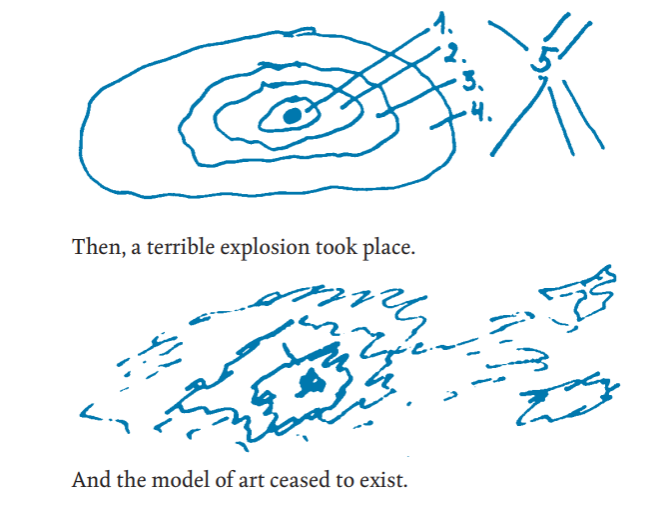 Image via Jerzy Ludwiński Notes from the Future of Art
Image via Jerzy Ludwiński Notes from the Future of Art
“…one can think of art as a star that exploded long ago and we mistakenly believe that the originating object still exists because the light from it still shines so brightly. This would mean that what we call “the art world” now is just the Baudrillardian death throes of a distant star and we are trapped in its immense gravitational pull, destined to be sucked into the black hole as it were.” – from an earlier post of mine “Escape, Invisibility, and Professional Suicide in Art – A brief foray into science fiction and a detective story”
“Post Art—things that aren’t artworks so much as they are about the drive to make things that, like art, embed imagination in material and grasp that creativity is a cosmic force…Things that couldn’t be fitted into old categories embody powerfully creative forms, capable of carrying meaning and making change. Post Art doesn’t see art as medicine, relief, or religion; Post Art doesn’t even see art as separate from living. A chemist or a general may be making Post Art every day at the office.” – Jerry Saltz “A Glimpse of Art’s Future at Documenta”

“I suspect that one reason for the artworld’s warm embrace of Rancière’s aesthetic theory is that it tells the artworld what it wants to hear about itself; it reinforces the glowing stereotype that the artworld fancies for itself – that is, as an inherently political and almost subversive place, whatever sort of predictable and conventional buffoonery it actually engages in.
…
And it may well be for this reason that ever more artists today are quitting the artworld, sacrificing their coefficient of artistic visibility in favour of a more corrosively dissensus-engendering capacity in the dominant semiotic order. For to see something as art according to the dominant performative paradigm of the contemporary artworld, is to acknowledge something terribly debilitating: that it is just art – not the dangerous, litigious, real thing. It is not my intent to deny that art can, on occasion, do what Rancière claims it can: for the artworld élite that likes that sort of thing, the concentrated, composed and self-reflective works one finds in museums have a disruptive value that is far from negligible. But deliberately circumscribing it within the policed structure of the artworld is to ensure that our relationship to art remains one of constantly renewed, constantly dashed hopes.” – Stephen Wright “Behind Police Lines: Art Visible and Invisible”
“Artists, as I have said, have made their retreat into theories of art, and art theorists into art. There emerges in art a gigantic whirlpool with no way out. The same holds true about art criticism. The most eminent art critics are absent from art journals. And though they continue writing, it is not for the magazines that shape public opinion and it is not about art. Their writing is no longer art criticism.” – Jerzy Ludwiński Notes from the Future of Art
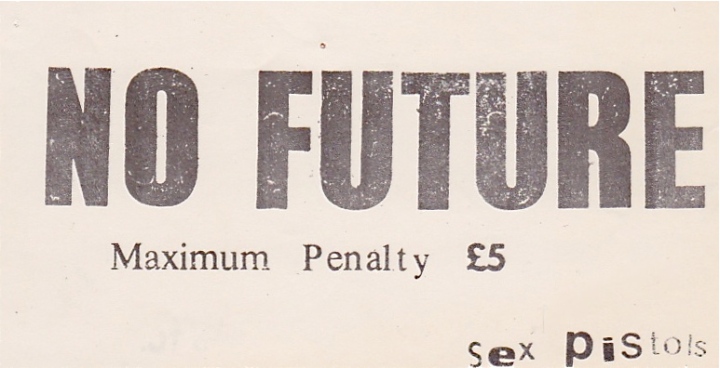
“It is now possible to say that much art and entertainment are pseudo-brend; that your brend is the total originality beyond art; that your brend is the absolute self-expression and the absolute enjoyment beyond art. Can brend, then, replace art, can it expand to fill the space now occupied by art and entertainment? To ask this question is to ask when utopia will arrive, when the barrier between work and leisure will be broken down, when work will be abolished. Rather than holding out utopian promises, it is better to give whoever can grasp it the realization that the experience beyond art already occurs in his or her life–but is totally suppressed by the general repressiveness of society.” – Henry A. Flynt, Jr. “ART or BREND?”
“Examples of Yellowism can look like works of art, but are not works of art. We believe that the context for works of art is already art. The context for Yellowism is nothing but Yellowism. Pieces of Yellowism are only about yellow and nothing more. All manifestations of Yellowism have the same sense and meaning and express exactly the same. In Yellowism, all the possible interpretations are reduced to one – are equalized, flattened to yellow. Interpreting Yellowism as art and being about something other than just yellow deprives Yellowism of its only purpose.” – Manifesto of Yellowism
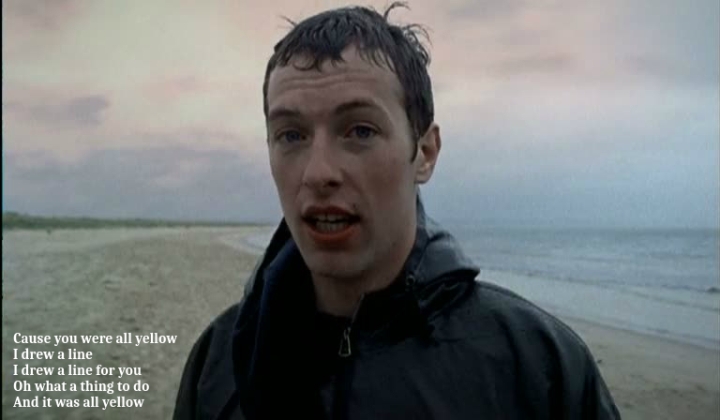
“…the idea of art cannot easily be gotten rid of (even if one wisely never utter the word). But it is possible to slyly shift the whole un-artistic operation away from where the arts customarily congregate, to become, for instance, an account executive, an ecologist, a stunt rider, a politician, a beach bum. In these different capacities…[art] would operate indirectly as a stored code that, instead of programming a specific course of behavior, would facilitate an attitude of deliberate playfulness toward all professionalizing activities well beyond art. Signal scrambling, perhaps. Something like those venerable baseball aficionados in the vaudeville act that began, “Who’s on first?” – Allan Kaprow “Education of the Un-Artist Part I”
“…They seem to be seeking to escape performative and ontological capture as art altogether. It is certainly possible to describe them as having a double ontology; but it seems more closely in keeping with their self-understanding to argue that this is not an ontological issue at all, but rather a question of the extent to which they are informed by a certain coefficient of art. Informed by artistic self-understanding, not framed as art.” – Stephen Wright “Use the country itself, as its own map”: operating on the 1:1 scale”
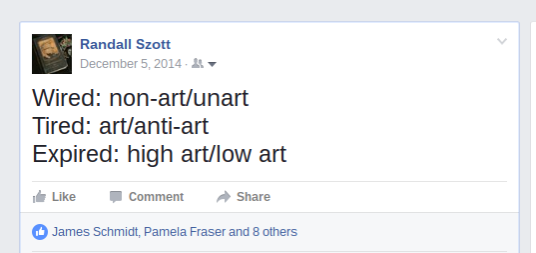
“How can we observe disappearance? Or worse still: absence. Not absence in an aesthetic sense, known as a major subject in aesthetic theory. But the absence of a social actor. The absence of a person who chose to be elsewhere than where we were accustomed to seeing them. What could an art historian say about someone who deliberately turned his back on art, including art historians? Why would art history consider “elsewhere” (than art) a place to notice?” – Alexander Koch with Stephen Wright “Quitting: a conversation with Alexander Koch on the paradoxes of dropping out”
“Clearly, they never meant a word of it, about the infinite revolution. But it never bothered the pundits that artists were trifling with revolutionary claims and slogans. There was never a suggestion of holding the artists to account. It is shocking to realize how important posturing is in campaigning for social rewards. Somehow, it is implicitly understood that the “revolution” talk is fantasy; and it is palatable precisely because it changes nothing, precisely because it only gilds collectible objects. It was lying that brought the vanguard artists respect as heroes. The civilization has been carried up the mountain on the back of a lie. Are we to conclude that a white person is somebody who believes that saying ‘infinite revolution’ is an infinite revolution?” – Henry A. Flynt Jr “1998 thoughts for the next draft”
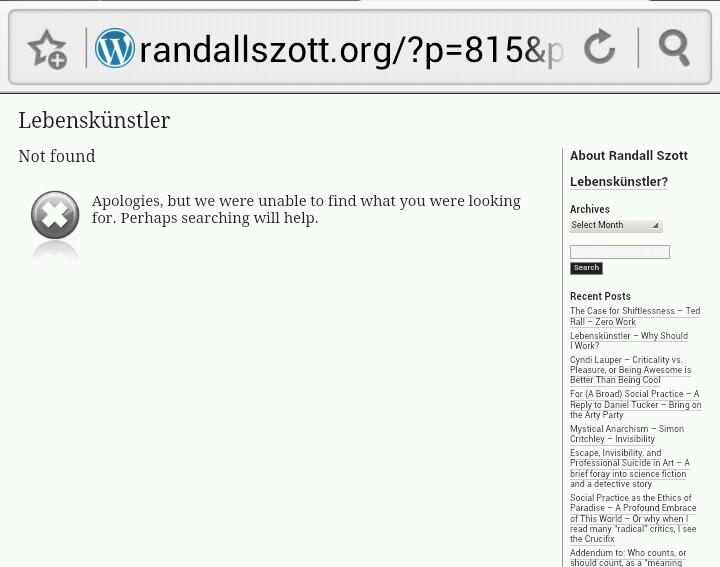

leave a comment